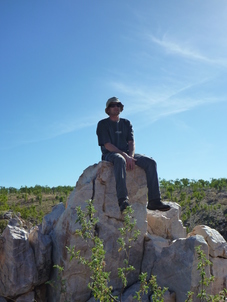Stefan W Maier (DrEng, MEng, BEng)

Stefan is a graduated engineer in Applied Physics (optics and electronics) (Fachhochschule Isny, 1993) and has been awarded the degree of Doctor of Engineering from the Technical University Munich in 2000 for his thesis Modeling the radiative transfer in leaves in the 300nm to 2.5μm wavelength region taking into consideration chlorophyll fluorescence - the leaf model SLOPE.
Stefan held Research Associate and Post-Doctoral positions at the German Aerospace Center where he was leading the MODIS Product Development Team. A three month holiday in Australia sparked his interest in this beautiful country. And so when a job opportunity at Satellite Remote Sensing Services, Western Australian Land Information Authority came up in 2002 he moved to Perth with his partner and one year old son. Here he soon learned about the importance of bushfires in Australia and that remote sensing is essential to monitor and manage them, especially in the north. One of his main achievements during this time is the development of an algorithm and system for automatic burnt area mapping delivering continental burnt area maps at 250m resolution which are updated twice per day. In 2007 Stefan and his family moved to Darwin where he took up a position as Principal Research Fellow - Remote Sensing at Charles Darwin University. In early 2015 he founded maitec.
Stefan's primary area of interest is the physics of remote sensing. He is interested in utilising applied physics for monitoring dynamic processes in vegetation incl. vegetation/atmosphere energy and matter exchange using space- and air-borne remote sensing data. His current focus lies in the remote sensing of bushfires (extend, intensity, severity, etc.) and resulting greenhouse gas and other emissions. Stefan also has a strong interest in remote sensing sensor technology and the application of modern information technology, like cluster and distributed computing, for processing the huge amounts of data generated by current remote sensing systems.
Publications